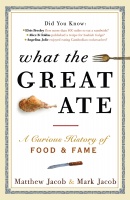I had the pleasure of speaking last week with Mark Jacob, co-author of What the Great Ate: A Curious History of Food & Fame. The piece was written up as a “10 minutes with …” that we have here at RNS. Looking through the book, in specific the “Soul Food” chapter that covers religious figures and philosophers, I found a couple of neat anecdotes that might offer “food for thought.”
First up, how food can bring enlightenment:
“The Supreme Buddha, Siddhartha Gautama, ate his way to enlightenment.
According to legend, a woman named Sujata took the milk from one thousand cows and fed it to five hundred cows, and then milked those cows and fed half that number, and so on. She used the milk from teh final eight cows to prepare a sweetened dish of milk-rice, which was served to Gautama in a golden bowl. Gautama divided teh meal into forty-nine rice balls and consumed them. He then tossed the golden bowl in a river, declaring, ‘If today I am to attain full enlightenment, may this golden bowl swim upstream.’ And indeed it did.”
At the same time, however, food can bring death:
“One day in 1784, elderly French philosopher Denis Diderot wanted to conclude his meal by eating an apricot. Diderot was well known for overeating, and his wife advised him not to consume the fruit. He replied: “But how the devil can that hurt me?” Diderot ate the apricot and died minutes later.”
And then there are the bizarre stories:
“Pope Martin IV loved eels. He arranged for them to be fished out of a lake and dropped alive into a vat of wine, which killed and pickled the eels. …In Dante Alighieri’s Purgatorio, the author imagines the pope loitering in purgatory because of his overindulgence. Dante’s work includes this ditty:
The eels are glad that he is dead / and lies interred in this low bed / who, as their doom for mortal sins, / when living stripped them of their skins.”
Look for the full interview with Mark next Wednesday.





